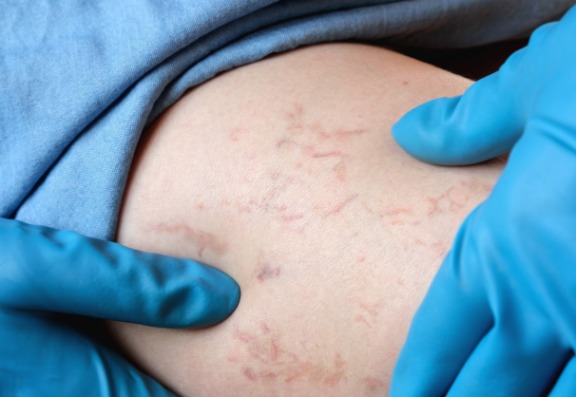Around 3 in 10 adults will, at some point in their life, develop varicose veins. Bulging veins, visible above the surface of the legs and thighs, varicose veins are not only an ugly nuisance but they can also be the cause of a lifetime of discomfort and embarrassment.
But why, when so many of us suffer from the condition, are we still unsure about the causes and health implications?
Here I’m going to provide you with ten useful facts about varicose veins and dispel some of the most common misconceptions along the way.
10 things you didn’t know about varicose veins…
Under the skin:
Varicose veins are often seen as a condition of concern for cosmetic reasons, an unglamorous body hang-up that we do our best to disguise. This may be true, but varicose veins can also cause aching, pain, itching, and a heavy feeling in the legs and can have greater health implications than most of us are aware of. It is very common for patients to seek treatment for cosmetic reasons and later go on to unearth deeper, underlying vein problems. With this in mind, it is always wise for vein sufferers to undergo a thorough examination, particularly if they are battling with any of the side effects above.

The curse of age: It is a common misconception that varicose veins only affect people in their old age. In fact, this is a condition which can affect people of all ages, even down to those in their mid and late teens.
Battle of the sexes: Contrary to popular belief, both women and men can suffer with varicose veins.
Stand up, sit down: Sitting for long periods does not cause varicose veins, nor does crossing the legs regularly. Similarly varicose veins are not the result of prolonged standing and existing veins will not worsen if you opt to stand for lengthy periods.
Keeping hydrated: Despite what many of us have been led to believe, lack of hydration does not cause or aggravate varicose veins
Exercise is good: Exercise does not cause or aggravate varicose veins. In fact, exercise improves circulation in the legs, causing the blood to flow smoothly and reducing the likelihood of blood pooling in the veins. Exercise also reduces blood pressure, putting less pressure on the valves in the veins and reducing the chance of them becoming damaged.
It’s all relative: Genetics are the biggest contributing factor to the development of varicose veins. If your parents or grandparents suffered from varicose veins, there is a far greater chance that you will also.
Added pressure: Obesity and weight gain can increase your chances of developing varicose veins. Excessive weight gain puts extra pressure on the veins, causing them to lose their elasticity and eventually to widen. This separates the valves so when they close to prevent a backflow of blood, they no longer meet. This results in the blood flowing backwards and causes pooling in the veins.
Nine months later: The chance of developing varicose veins increases with pregnancy. Contrary to popular belief the weight of the baby has no or very little impact in the development of varicose veins. It is more likely that the hormonal changes during pregnancy loosen the valves in the veins which allow them to swell up and bulge, In addition, pelvic varicose veins, particularly in relation to the ovaries, can develop and exacerbate the varicose veins in the legs.
Over the counter: Herbal remedies or varicose vein supplements will have no impact on the condition. Varicose veins cannot be cured by over-the-counter products. One of the most effective treatments currently available is Endovenous Laser Ablation (or EVLA) and involves inserting a fine laser fibre into the vein and delivering laser energy to seal the vein, preventing blood from flowing through it
If you want to read more, the experts at Consulting Room really know what they're talking about and have put together some varicose veins and Endovenous Laser Ablation (or EVLA) FAQs just for you.
If you have more questions, you can use the varicose veins and Endovenous Laser Ablation (or EVLA) questions feature to talk to our panel of trained medical experts.
If you're keen to get started with any of these treatments right away then you're in luck - those clever folks also have a list of trusted, accredited varicose veins and Endovenous Laser Ablation (or EVLA) clinics in your area.
Halloween is almost here but one thing you shouldn’t feel scared of is having treatment! We spoke to a Dr to get the ultimate guide on what to look out for...
Choosing the right Microsclerotherapy is crucial in treating spider veins, here's what you need to know...
This is everything you need to know about choosing the right Microsclerotherapy Sclerosant in 2024...
Hey, wait!
Before you go.....
Let's stay in touch, pop your details here and we'll send our editor's hand-picked updates on your fave subjects.